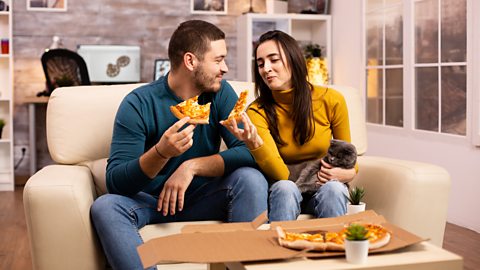Healthy ways to manage emotional eating
Boredom, stress, anxiety and tiredness are some of we eat “less healthily than usual” during lockdown, according to a YouGov survey for the British Nutritition Foundation (BNF). But why do these feelings influence what we eat and are there better ways to regulate them?

Causes of emotional eating
Emotional eating can be driven by our survival instincts. “Our bodies don’t recognise the difference between the stress of a lion chasing us and the stress of deadlines at work”, says medical doctor Aishah Muhammad. Dietitian Sophie Medlin explains, “when you’re stressed, you crave food that is easy to digest and releases energy quickly to help you fight or run away – sugar and carbohydrates”.
Almost two-thirds of Brits in the BNF survey say boredom is the main cause of their unhealthy lockdown eating. boredom with eating for escapism, but there’s good news: it also associates it with increased consumption of healthy food, so long the food is “exciting”.
When we’re sleep deprived, shows we may eat almost 400 calories per day more than when we sleep well, because we “draw on quick energy sources to keep us awake, usually carbohydrates”. “Being sleepy also increases hunger hormones”, says Medlin.
When we eat, we produce dopamine, the brain chemical responsible for reward and pleasure feelings. , particularly those high in fat and sugar, stimulate dopamine production more than healthier options. This can lead to the “dietary pleasure trap”, says Dr Douglas Lisle, psychologist and author of The Pleasure Trap: Mastering the Hidden Force that Undermines Health and Happiness. Your instincts tell “you to seek the most pleasure for the least pain and the least effort”, he explains, but the more you trigger the pleasure receptors in your brain, the less impact it will have.
The 3Fs to overcome emotional eating
Dr Rangan Chatterjee, author of Feel Great Lose Weight and The Stress Solution, encourages us to focus on what we eat as well as whether we eat in his “3 Fs” to overcome emotional eating. The 3F technique is to:
Feel: When hungry, take a pause and ask yourself if you’re bored, lonely or stressed. If you’re hungry, eat.
Feed: Consider how what you choose to eat feeds the feeling you identified in the first F. How does eating it make you feel – better, worse or no change?
Find: Can you find a non-food behaviour to deal with the emotion instead? It could be exercise, a yoga practice, a long bath, sleeping, calling a friend, or using to reduce anxiety and stress.
Is emotional eating ever good?

There may be situations where food makes you feel better. Dinner and a movie or baking can be positive emotional experiences, says nutritionist Rachael Hartley. By eating with mindfulness and intention, “you’re much more likely to savour your food and the experience”, as opposed to impulsively eating emotionally, she says. What’s more, emotional eating doesn’t have to mean .
However, “food rarely fixes problems and it can’t help you process difficult things, so we have to look beyond food as a way of coping with challenges”, she continues. Eating “should not be the only coping mechanism in your toolkit”.
Be kind to yourself
If you find yourself eating emotionally and you don’t feel able to control it, remember these are not normal times and you might not want to eat in your normal way. “Right now, that’s ok”, says dietitian Priya Tew. “This is a time to look after yourself and those around you, to nourish your body the best way you can and find pleasure where you can too. Whilst a balanced diet is always the aim, it is okay to eat differently right now with no guilt, anxiety or fear. This is especially thinking about those of you who struggle with disordered eating thoughts or are in recovery from an eating disorder. Keep being kind to yourself.”